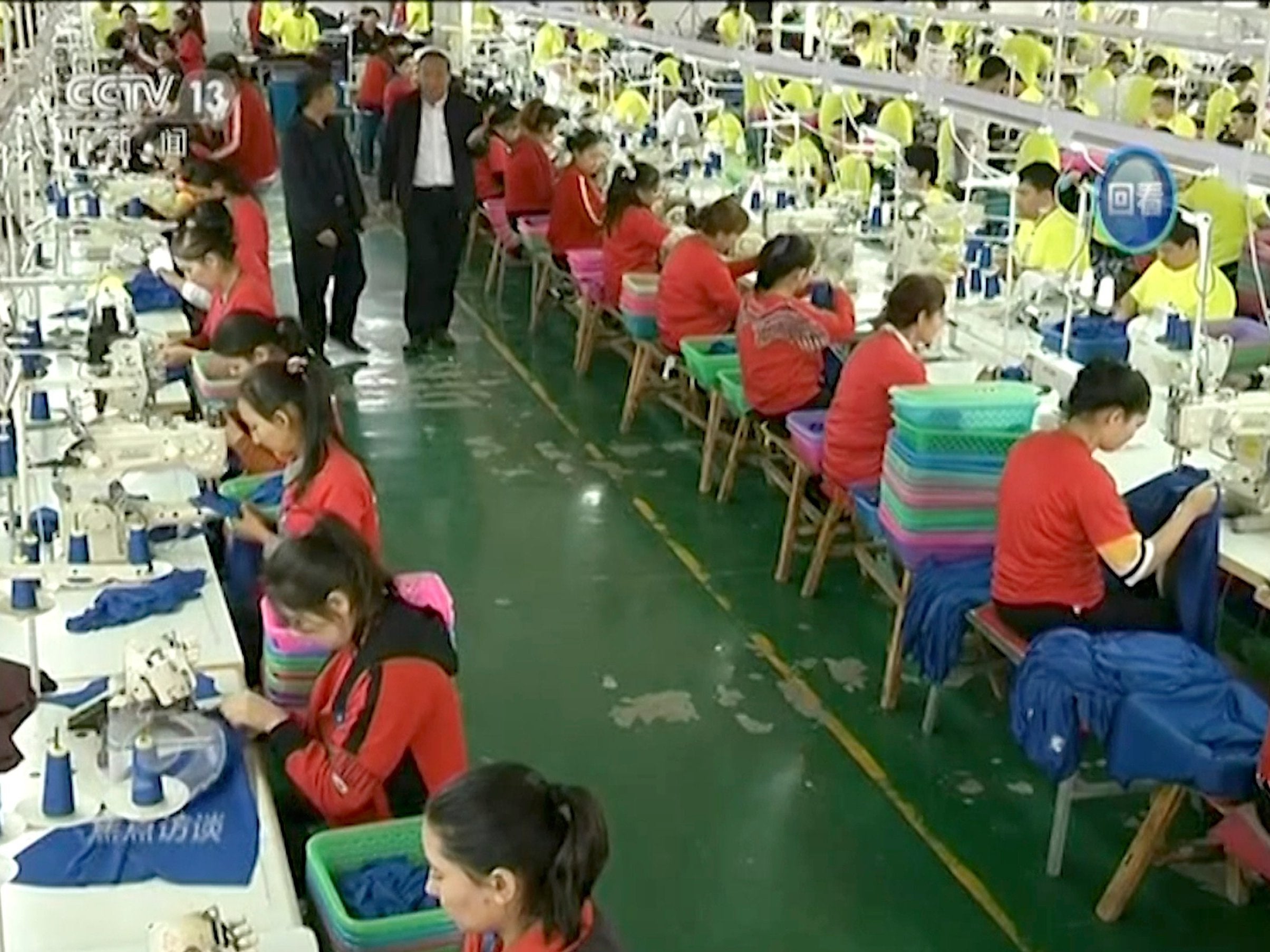US clothing company cuts ties with Chinese factory in Muslim internment camp
Badger Sportswear stops sourcing products from Xinjiang region 'given the controversy' about treatment of Uighur minority
An American sportswear supplier has cut ties with a Chinese company that sourced forced labour from an internment camp where Muslims have allegedly suffered “grave” human rights violations.
Badger Sportswear, which sells kits and athletics gear to university teams, said it would no longer import any products from northwestern China “given the controversy” about Beijing’s treatment of ethnic minority Uighurs and Kazakhs.
The firm suspended shipments from Hetian Taida Apparel in December after an Associated Press investigation found the Chinese manufacturer was operating a factory inside one of the re-education camps in Xinjiang, where millions of Muslims have been detained.
Former internees have described being forced to renounce Islam and pledge allegiance to the Chinese Community Party in the heavily guarded facilities. Some have alleged they were tortured.
The Chinese government has also been forcing detainees to work in manufacturing and food industries, either inside the camps or at privately owned, state-subsidised factories where they are sent after release.
The Associated Press tracked shipments late last year from a factory inside a camp in Xinjiang to Badger in Statesville, North Carolina.
In a statement posted on its website, Badger said: “Upon hearing these press reports, we immediately suspended ordering, receiving or shipping any product from the supplier, Hetian Taida Apparel Co Ltd, and launched a multi-faceted investigation. This process included internal reviews and an investigation conducted by outside legal counsel working with a global forensic accounting firm.”
The US firm said documentation provided by Hetian Taida about its factory “was insufficient to conclude with certainty that it had met Badger’s Global Sourcing Policy”.
It added: “Therefore, out of an abundance of caution and to eliminate any concerns about our supply chain given the controversy around doing business in northwestern China, we will no longer source any product from Hetian Taida or this region of China. Furthermore, we will not ship any product sourced from Hetian Taida currently in our possession.”
Products supplied by the Chinese company accounted for about one per cent of Badger’s annual sales, the US firm said.

Associated Press said Hetian Taida’s chairman, Wu Hongbo, did not respond to repeated requests for comment. Mr Wu has previously insisted the company was not affiliated with the camps, which the government calls “vocational training centres”, but had employed 20 to 30 “trainees” one such facility in Hotan, a city in southern Xinjiang.
Chinese foreign ministry spokesman Lu Kang suggested Badger was acting on “misinformation.”
He said the camps in Xinjiang were “totally different from so-called forced labour,” before referring to previous statements from regional government, which claims the centres help poor Uighurs gain employable skills.
“It’s a tragedy for that business,” Mr Lu added.
Universities stocking Badger clothing began pulling items from their shelves and websites after their links to the camps emerged last month.
Hetian Taida was certified as complying with good business practices by Worldwide Responsible Accredited Production (Wrap), a not-for-profit organisation which certifies ethical manufacturers.
Wrap sent an auditor to a Hetian Taida factory, but not the one inside the internment camp, and found it was was “not engaged in the use of forced labour”.
A Wrap spokesman confirmed the camp audited was not the same facility at the centre of the Associated Press investigation.
“Our model centres around factories approaching us requesting to be audited,” Seth Lennon said. “We do not seek out any factories whatsoever to audit unsolicited.”

The Washington-based Workers Rights Consortium (WRC), which has agreements with many educational institutions across the US to ensure the products they sell on campus are ethically manufactured, conducted its own investigation and found additional evidence confirming the factory supplying Badger was inside an internment camp.
WRC executive director Scott Nova said Wednesday’s announcement reinforced that finding.
“There is nothing in Badger’s statement, or Wrap’s, that calls into question the conclusion that Hetian Taida used detainee labour while producing for Badger,” he said.
Any item produced using forced labour is illegal in the US and subject to seizure by Customs and Border Protection (CBP), which said in December it was reviewing the reports about Hetian Taida.
A request for comment from CBP following Badger’s announcement returned an automatic message that spokespeople were unable to respond to emails or telephone calls due to the federal government shutdown.
Experts said this week that the detainment of millions of Muslims in Xinjiang was the worst human rights abuse in China since Chairman Mao’s era. Amnesty International has compared the centres to “wartime concentration camps”.
Join our commenting forum
Join thought-provoking conversations, follow other Independent readers and see their replies
Comments
Bookmark popover
Removed from bookmarks